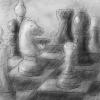This didn't really seem to fit anywhere so I put it here in the lounge.
When you start making a game, do you go through planning the whole thing out (story, characters, controls, graphics) in detail or do you just start programming based on a general idea of what you want to create?
I ask because I've been doing the latter and have ended up making tech demos, not games. See, I get the original idea and it seems pretty good so I start programming. I get to the point where everything is fairly well in place. I've got a world loading, the player can control his character and shoot/use powers/change weapons/whatever, enemies load and respond to the player, collisions work, etc. All I need is content creation: building levels, more enemies, and creating a story for the game. This is where I get stuck. The original idea seemed good but I can't seem to go anywhere beyond basic game-play with it. It's really frustrating. I was wondering if it's better to not start work on programming and force yourself to get a whole plot and everything before starting. This, however, is very difficult for me. I view myself as one of the least creative people I know and it's just annoying not being able to go anywhere with my games.
Thanks for your input.











